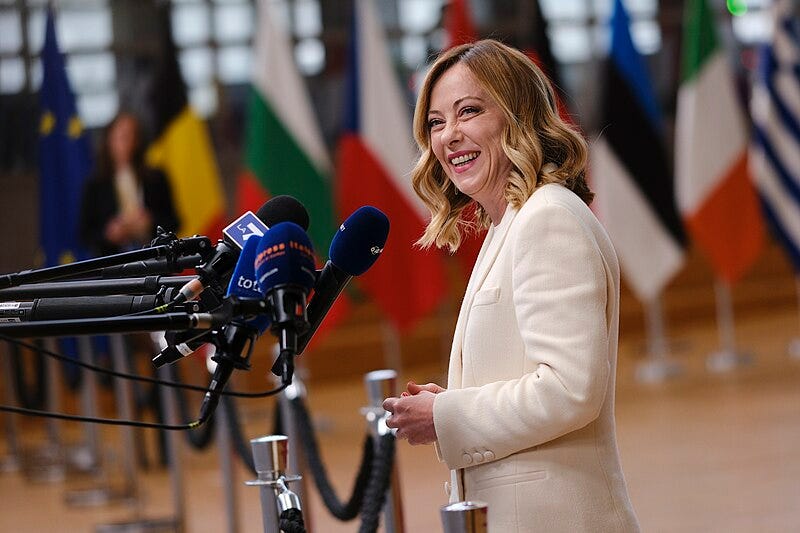4 Big Stories in the European Parliament Election
What to watch for if you (like many people) haven't been watching this election.

Between June 6-9, an estimated 400 million Europeans will be eligible to cast ballots to elect 720 members of the European Parliament, one of the legislative bodies of the EU. The electorate is the world's second-largest outside of India; in 2019, about 50 percent of eligible voters turned out to vote in EP elections.
The European Parliament elections usually generate little interest outside Europe. Even within Europe, many voters do not fully understand what the EP does; this is not the fault of the voters, as EU institutions are complicated. However, with 2024 being a pivotal election year, four throughlines have emerged on the campaign that reverberate in democracies worldwide.
The rise of the far-right
Far-right parties are poised to gain their share of members in the new parliament. (National parties have counterparts at the European level.) According to Politico, the Identity and Democracy (ID) grouping is expected to rise from 58 to 69 seats and the European Conservatives and Reformists Party (ECR) from 67 to 75. New unaffiliated members, most of whom are on the far-right, are expected to number around 55. (Due to population growth, the parliament is overall increasing in size from 705 to 720 members.) While these numbers are not enough to form a majority coalition -- and there are disagreements between them, notably on Ukraine aid -- these parties are likely to be more influential on issues such as climate and migration.
Their expected gains are part of a global trend towards populist nationalism. In the United States, Donald Trump has an even shot of winning the November election. In India, Narendra Modi is expected to win a third term, a rarity in Indian politics. In Israel, Prime Minister Benjamin Netanyahu governs at the mercy of far-right parties that have no interest in allowing the Palestinian Authority to share in the governing of postwar Gaza; hence, Israel's military campaign continues with no end in sight.
Mainstream willingness to co-opt or work with the far-right (with conditions)
European Commission President Ursula von der Leyen needs the approval of the European Parliament for a second five-year term. (The EC is the EU's executive arm.) She is a member of the center-right European People's Party, which is affiliated with the center-right German Christian Democratic Union (CDU). Ahead of the vote, she has not ruled out working with far-right parties; however, she said in February that she would work with parties that are "pro-European, pro-NATO, pro-Ukrainian, [and] clearly supporters of our democratic values.” For approval, Von der Leyen may need votes from the European Conservatives and Reformists grouping, which is affiliated with Italian Prime Minister Georgia Meloni and her Brothers of Italy party.
Her softer stance is part of a European trend where mainstream parties have sometimes co-opted far-right ideas or appeared open to working with far-right parties. In France last December, centrist President Emmanuel Macron passed a tough immigration law that was much harsher than the original text; far-right leader Marine Le Pen claimed an "ideological victory." In the East German state of Thuringia last year, German conservatives joined the far-right Alternative für Deutschland (AfD) in passing a property tax cut. While conservative parties have drawn boundaries on forming coalitions with the far-right, these boundaries are softening.
Russian and Chinese influence campaigns
The EP has been rocked by scandals involving alleged Russian and Chinese influence campaigns. In April, Belgium's federal prosecutor opened an inquiry into a pro-Russian website that has been accused of paying MEPs to promote Kremlin propaganda. Czech authorities sanctioned the website. In a separate case, the EP fined a Latvian MEP who has been accused of working with Russian secret services. In April, German police arrested an aide to MEP Maximillian Krah, a member of the AfD; the aide was accused in court documents of being "an employee of the Chinese secret service."
On May 24, the far-right ID grouping expelled AfD from its parliamentary slate as a result of these scandals and after LePen -- whose party also is affiliated with ID -- said she wouldn't sit with them. Now that LePen has distanced herself from AfD's embarrassing scandals, she is trying to woo Meloni to form a far-right big-tent grouping; however, the far-right remains divided over Ukraine. For example, Meloni is strongly in favor of aid, while Hungary's Fidesz, who is unaffiliated, opposes sending weapons to Ukraine.


